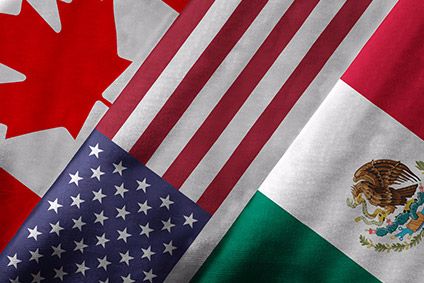
Amid ongoing frustration that the United States Mexico Canada Agreement (USMCA) has still not been signed off by Congress or President Trump, groups representing US apparel and footwear brands, retailers and importers have joined calls for the trade pact to be made into law.
According to vice president Pence, the Trump administration is making efforts to get USMCA approved by US Congress this summer, while Canadian Prime Minister Justin Trudeau in May formally introduced legislation to the Canadian parliament to ratify the deal.
But 600 US trade organisations have now written to Congress urging support for the USMCA, which would replace the North American Free Trade Agreement (NAFTA), and is sometimes referred to as NAFTA2.0.
They say the new accord is “critical to our economic future because it will preserve and strengthen US trade ties to Canada and Mexico.
“More than 12 million American jobs depend on trade with Canada and Mexico. US manufacturers export more made-in-America manufactured goods to our North American neighbours than they do to the next 11 largest export markets combined, and the two countries account for nearly one-third of US agricultural exports. They are also the top two export destinations for US small and medium-size businesses, more than 120,000 of which sell their goods and services to Canada and Mexico.”
The groups, which include the American Apparel & Footwear Association (AAFA), National Retail Federation (NRF) and the Outdoor Industry Association (OIA), add: “Approval of USMCA will ensure US manufacturers, farmers, and service providers can continue to access the Canadian and Mexican markets. The new pact guarantees that virtually all US exports will enter these markets tariff-free.

US Tariffs are shifting - will you react or anticipate?
Don’t let policy changes catch you off guard. Stay proactive with real-time data and expert analysis.
By GlobalData“USMCA will also modernise North American trade rules. For example, when NAFTA was negotiated a quarter century ago, there was no e-commerce; consequently, the agreement did not address this sector. USMCA’s digital trade chapter sets a new, high standard, as the agreement does in areas from intellectual property protection to trade in services.”
The letter concludes: “By creating a level playing field for trade in North America, USMCA will help US companies and the workers they employ compete in our top two export markets. The case for the agreement’s approval is strong. We urge Congress to approve USMCA as soon as possible.”
USMCA will offer qualifying textiles and apparel, travel goods and footwear originating from the USMCA region duty-free access to the US and Canadian markets.
It also includes new provisions that incentivise greater North American production in textiles and apparel, strengthen customs enforcement, and facilitate broader consultation and cooperation among the three parties. Indeed, a recent report from the US International Trade Commission concluded that the USMCA is a balanced deal for the textile and apparel sector.
The results of an annual survey published earlier this week found 65.5% of executives from leading US fashion brands, retailers, importers, and wholesalers want the US Congress to pass USMCA.
More than half of respondents explicitly say NAFTA is important to their business and they want a seamless transition from NAFTA to USMCA. However, around one-fifth (20%) admit they do not fully understand the rule changes in USMCA for textiles and apparel.
The ‘2019 Fashion Industry Benchmarking Study’ published by the United States Fashion Industry Association (USFIA) also says that reducing uncertainty about its ratification will be key to the success of the agreement.




